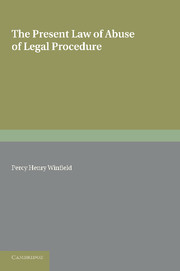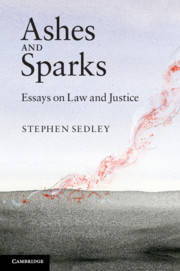English Civil Justice after the Woolf and Jackson Reforms
John Sorabji examines the theoretical underpinnings of the Woolf and Jackson reforms to the English and Welsh civil justice system. He discusses how the Woolf reforms attempted, and failed, to effect a revolutionary change to the theory of justice that informed how the system operated. It elucidates the nature of those reforms, which through introducing proportionality via an explicit overriding objective into the Civil Procedure Rules, downgraded the court's historic commitment to achieving substantive justice or justice on the merits. In doing so, Woolf's new theory is compared with one developed by Bentham, while also exploring why a similarly fundamental reform carried out in the 1870s succeeded where Woolf's failed. It finally proposes an approach that could be taken by the courts following implementation of the Jackson reforms to ensure that they succeed in their aim of reducing litigation cost through properly implementing Woolf's new theory of justice.
- Places the nature of the Woolf and Jackson reforms in their historical context
- Readers will gain an in-depth understanding of what the House of Lords has described as the new philosophy of English civil justice
- Explains how the courts can properly implement the Jackson reform's aim of reducing litigation costs to no more than are proportionate
Reviews & endorsements
"The significance and originality of the work lies in the success of Sorabji's jurisprudential project - to place the reforms of Woolf and Jackson in the wider context of theories of justice and, in particular, to identify structural similarities between Lord Woolf's vision and the prescient writings of Jeremy Bentham."
Richard Susskind, The Times
"… a polished, sophisticated, challenging, and important study. It will enrich all courses on civil justice where the professor or student dares to ask: 'what are these rules for; and how should they be implemented?'."
Neil Andrews, International Journal of Procedural Law
Product details
June 2014Adobe eBook Reader
9781139950558
0 pages
0kg
This ISBN is for an eBook version which is distributed on our behalf by a third party.
Table of Contents
- Part I. Theories of Justice:
- 1. The crisis in civil justice
- 2. Substantive justice and the RSC
- 3. Bentham, substantive justice is no end in itself
- Part II. Woolf's New Theory of Justice:
- 4. Woolf's new theory: a traditionalist view
- 5. The overriding objective: a new theory of justice (I)
- 6. The overriding objective: a new theory of justice (II)
- Part III. Implementation:
- 7. Problems of proportionate justice.





.jpg)